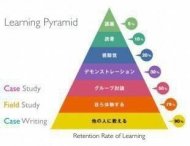The difference between MBA holders and SME management consultants
It's very important to understand the differences between an MBA holder and a small-to-medium enterprise (SME) management consultant. Since the test for SME management consultants deals with many subjects studied in an MBA curriculum—marketing, financial management, accounting, and human resource management—news stories sometimes treat the two programs as identical. Here, I'd like to focus on explaining the similarities and differences between MBA and SME management consultant programs.
Differences between MBA and SME management programs
According to Japan's School Education Act, an "MBA" is a Master's degree in business administration; it is listed on resumes under the "Academic Background" section. An SME management consultant, on the other hand, is a position that requires national accreditation under Japan's Small and Medium Enterprise Support Act; it should be listed under the "Qualifications" section of your resume. This is the first systematic difference between the two. Another big difference is that those seeking an MBA must enter graduate school and successfully complete the number of credits required to graduate; those seeking to become SME management consultants must pass a preliminary and secondary exam (both of which have pass rates of 20%) and update their registrations every five years after obtaining their certification.
Regarding curriculum, the differences between the two programs are nearly endless, so we will not touch on them here. However, MBA studies feature numerous management dilemmas where there is no correct decision (for example, whether or not to proceed with a dubious project without any modifications). SME management consultant training is directed at obtaining an SME management consultant license; much of the program's material covers issues that have simple right-or-wrong answers.
Commonalities between MBA and SME management consultant programs
Both programs are suited to professionals such as lawyers, accountants, and doctors who are not in "exclusively business" professions but who do want to improve their management abilities. There are claims that MBA programs use theoretical leadership models while SME management consultant programs use hands-on leadership models, but in recent years, MBA education has intensified its use of outside-the-classroom learning such as fieldwork and project-based learning. SME management consultant programs, meanwhile, are attempting to address their delay in discussing globalization in their curricula. Both types of programs strive to deal with real issues regularly encountered in business.

 Brochure
Brochure
 Info Session
Info Session
 Application
Application
 Alumni Voices
Alumni Voices






